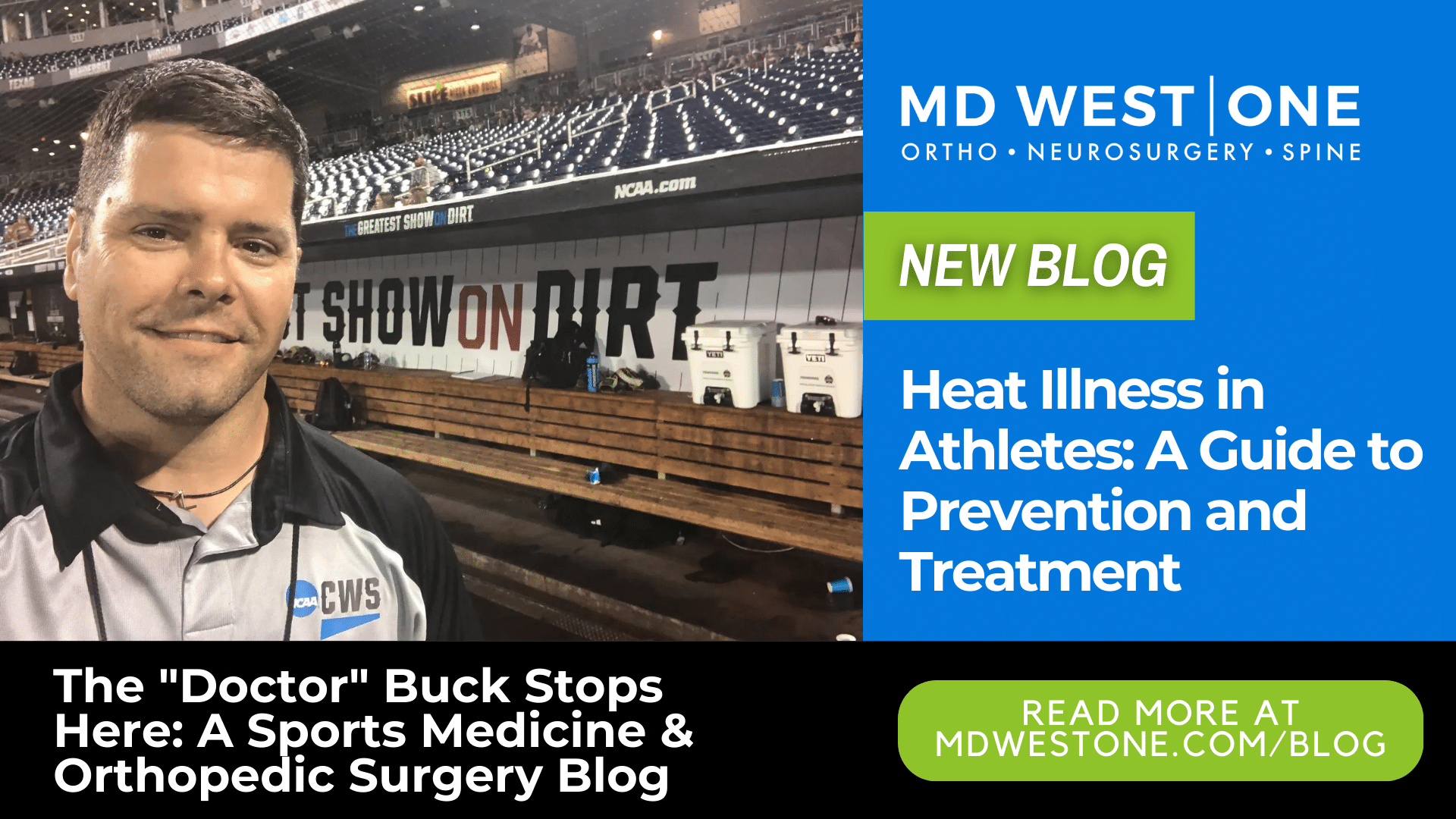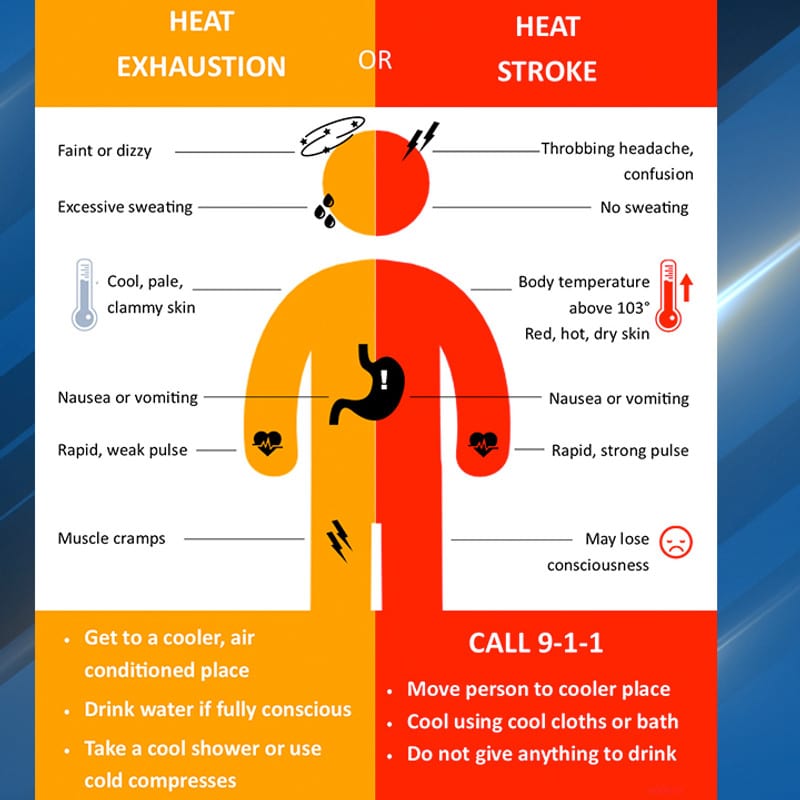
Authored by: David C. Buck, M.D. - Orthopedic Surgeon and Sports Medicine Specialist at MD West ONE (Omaha and Fremont, Nebraska)
As we kick off the fall sports season it is important to recognize some young athletes may experience heat-related problems or injuries. Extended or twice daily practices in the Midwestern summer can put our student athletes at risk. The NFHS has excellent guidelines about safe practice sessions regarding temperature and relative humdity. Despite this, many athletes still sustain heat illnesses during the sports season.
Heat-related illnesses including heat cramps, heat exhaustion and heat stroke, are a concern for all of our athletes. Parents need to be aware of young athletes who are new to a sport or may not have been training as well up to fall camps. Athletes who are recovering from illness and enter a sport with mild dehydration are also at increased risk. Parents, athletes, and coaches also need to be aware that those who play sports that require wearing heavy equipment (eg, football) are at higher risk. Studies have shown that the risk of developing a heat-related illness is 11.4 times higher in football than all other sports combined.
The following information can help coaches, athletes, and parents reduce the risk of heat illness in their young student athlete.
1. Two Week Period of Heat Acclimation
Slowly getting used to the heat is the biggest way to prevent heat illness. The heat and humidity combine with physical exertion to put the athlete at risk. It doesn’t always have to be the hottest or sunniest day for a heat illness to occur. Over the course of the initial two weeks of heat exposure, athletes should gradually increase the intensity, duration, and exposure of their outdoor exercise. The National Athletic Trainers’ Association suggests a 14-day period in their high school guidelines. This is especially true for younger athletes or athletes that report to camp out of shape or overweight.
2. Drink Plenty of Water
It is important for the athlete to stay hydrated to help prevent heat-related illness. Drinking before and after practice is as important to drinking water during practices. Coaches and parents need to make sure unlimited amounts of water are available for athletes during practices and games. Regular water breaks should be instituted by coaches to make sure all kids are getting access to water. Many coaches will practice early in the morning or later in the evening to avoid those peak sun and heat times to reduce the risk of heat illness.
Dehydration can be a component of a serious heat-related disease. It is also a dangerous side effect of diarrhea, vomiting, and fever. The following are the most common symptoms of dehydration: thirst, less-frequent urination, dry skin, fatigue, light-headedness, dizziness, confusion, dry mouth and mucous membranes, increased heart rate and breathing.

3. Early Recognition and Cooling
If an athlete has signs of heat illness immediate attention is required. The coaches, athletic trainers, and parents need to be aware of the signs and symptoms of heat illness. Quick recognition of a heat-related illness is of the utmost importance. These signs can include: disorientation, dizziness, weakness, unusual behavior, headache, or vomiting. If a young athlete is showing signs of heat illness they should be removed from play and into a cool area, immediate cooled down with ice packs or cool compresses, and given water. Cold compresses or ice packs should always be kept available if an athlete is overheated and needs immediate cooling.
If the weather conditions, athlete condition, and exercise volume or intensity raise a concern for heat illness the response needs to be immediate, or the life of the athlete can be placed at risk. If available, they should evaluated by the Certified Athletic Trainer or other medical providers. If an athlete has signs of severe heat illness remove them from play to a cool area, begin immediate cooling, and call 911 for transport to the ER. It is best to err on the side of caution with our athletes regarding heat illnesses and make sure they received the appropriate medical evaluation and care.
What is Heat Stroke?
Heat stroke is the most severe form of heat illness and is a life-threatening emergency. This is a result of extended exposure to heat and humidity coupled with vigorous exercise. In this case, a person does not sweat enough to lower body temperature. This condition can develop and progress rapidly and need immediate treatment as it can be life-threatening. If an athlete becomes significantly dehydrated and cannot sweat enough to cool their body, their core body temperature may rise to dangerous levels and lead to heat stroke. The most common symptoms of heat stroke may include: headache, dizziness, disorientation, agitation, or confusion, fatigue, hot dry skin that is flushed but no longer sweaty, dangerously high body temperature, loss of consciousness, rapid heartbeat, or hallucinations.
If there is a concern and signs and symptoms of heat stroke the athlete needs to be seen by EMS (call 911) and taken to the Emergency Department for evaluation and treatment.
Personal Note from Dr. Buck: A new school year and a fresh optimistic sports season is on the horizon. It is important to keep our athletes (youth, high school, and college) safe and be aware of the risk of heat related illnesses. Stay hydrated and take cool-down breaks during practices. Be aware of the signs and symptoms of heat illness and if there is concern then I recommend evaluation by medical professionals. Wishing everyone a safe and fun fall sports season!
About Dr. Buck:
Dr. David Buck is a Board Certified Orthopedic Surgeon with a Certificate of Added Qualification as a Sports Medicine Specialist with MD West ONE.
Dr. Buck serves as the Team Physician for Midland University and also is a part of the Sports Medicine team providing coverage for the NCAA College World Series in Omaha. He works closely with several local area high schools and their sports medicine programs. Dr. Buck is a former Certified Athletic Trainer as well as an athlete and coach. He can be reached at (402) 721-0090 to schedule an appointment at either our Elkhorn (192nd & Dodge) or Fremont locations.

